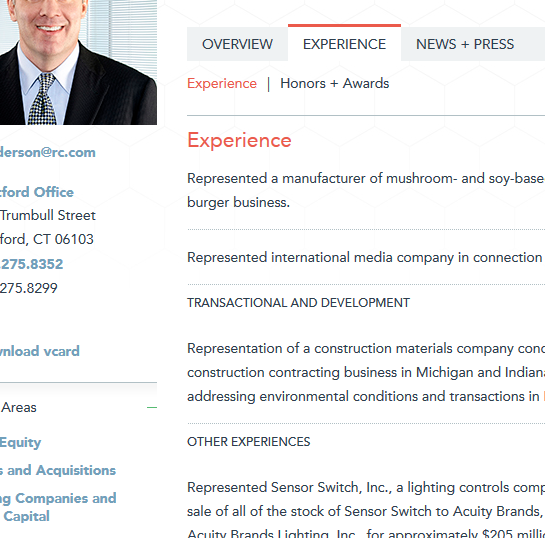CommonSpot allows you to easily connect and relate content throughout your website. Using CommonSpot’s data manager tool, you can easily relate blog posts with attorney profile pages, news articles with practice pages, and so on. There is no limit to the kinds of relationships you can create, eliminating the need to manually duplicate content. This also eliminates the challenge of maintaining content when information changes. Add a new attorney blog post, and the attorney profile page is easily updated with one simple click allowing you to relate content throughout your site instantly. Related or “see also” content also eliminates dead end pages where visitors typically tend to leave your site. By relating relevant “see also” content to a news page for example, you give site visitors a reason to continue surfing your site, enriching their journey and creating exceptional web experiences.

If content is king, customization is queen. The best sites create unique environments that anticipate the needs and interests of their constituents and are constantly on the lookout for new ways to serve them. CommonSpot advances its already extensive custom object support with a Data Manager field type that provides an interface to display and manage related data from different content objects within a single editing interface.
With this capability sites can easily create a wide range of applications based on one-to-many or many-to-many relationships. For example, you might associate a single piece of collateral with one or more case studies or events, or create an extranet interface that allows team members to manage their schedules across office locations. The Data Manager also allows you to bind related metadata forms, for even more flexibility in customizing interactive presentations.
- Use the Data Manager to enable team members to manage data from different content objects in a single interface.
- Create custom presentations for point-and-click add, edit, delete, and reorder actions for data records.
- Source data from custom content objects or metadata forms.
- Conveniently "join" data through the CommonSpot interface instead of directly through the database.
LEGAL FEATURES
- Accolades & Awards
- Analytics
- Attorney Profiles
- Blogs
- Career Opportunities
- Contact Us
- Events Calendar
- Managing Content
- Mobile & Responsive Design
- News & Legal Notices
- Office Locations
- Personalized Content
- Practice Pages
- Related Content
- Search
- Search by Practice Area/Industry
- Search Engine Optimization
- Secure Client Login
- Social Media
- Video & Multimedia
